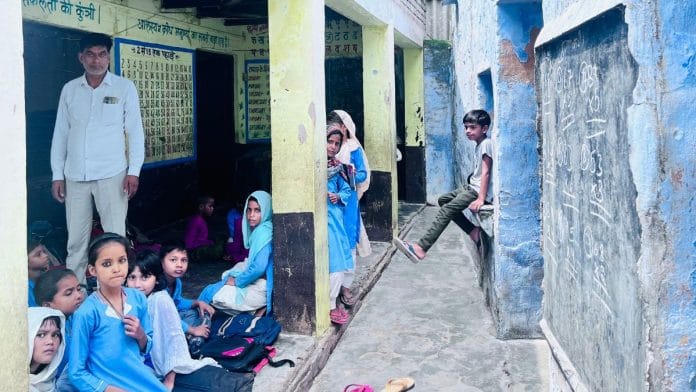New Delhi: More than 33 lakh Indian students remain enrolled in schools run by a single teacher, and the nearly one lakh schools where they study are yet to recruit another teacher apart from the one they have, despite efforts to improve the situation.
According to the Unified District Information System for Education Plus (UDISE+) data, released last week by the Union Ministry of Education for the academic year 2024–25, 1,04,125 schools in India are run by a single teacher, and such schools cater to 33,76,769 students.
The highest number of single-teacher schools is in Andhra Pradesh, followed by Uttar Pradesh, Jharkhand, Maharashtra, Karnataka, and Lakshadweep. However, when it comes to student enrolment in schools with a single teacher, Uttar Pradesh tops the list, followed by Jharkhand, West Bengal, and Madhya Pradesh.
Although the number of single-teacher schools has decreased—from 1,18,190 in 2022–23 to 1,10,971 in 2023–24—they remain a significant concern in India.
“Due to the conscious and meaningful governmental interventions, the single teacher schools have reduced by around six percent in the reporting year in comparison with the previous year,” the ministry said.
Officials said efforts are underway to redeploy teachers from schools with zero student enrolment to single-teacher schools to ensure “optimal teacher availability”.
“Efforts are also being made to reduce the number of single-teacher schools further, as they hinder the teaching-learning process,” a senior government official told ThePrint.
Also Read: Delhi HC ban on ‘shadow libraries’ is pushing Indian researchers up against the paywall
Andhra Pradesh, UP & Jharkhand
In a state-wise comparison, Andhra Pradesh has 12,912 single-teacher schools, followed by Uttar Pradesh having 9,508 such schools, Jharkhand 9,172, Maharashtra 8,152, Karnataka 7,349, Lakshadweep 7,217, Madhya Pradesh 7,217, West Bengal 6,482, and Rajasthan 6,117.
There are no single-teacher schools in the Union Territories of Puducherry, Ladakh, Dadra and Nagar Haveli and Daman and Diu, and Chandigarh. The Andaman and Nicobar Islands have just four single-teacher schools, and Delhi has only nine.
In terms of student enrolments in single-teacher schools, Uttar Pradesh leads, with 6,24,327 students taking lessons in its single-teacher schools, followed by Jharkhand with 4,36,480 students, West Bengal with 235,494, Madhya Pradesh with 2,29,095, Karnataka with 2,23,142, Andhra Pradesh with 1,97,113, and Rajasthan with 1,72,071, among others.
Teachers in such schools say the basic teaching-learning process becomes quite difficult without another teacher, besides them. With the National Education Policy (NEP) 2020 emphasising the progress monitoring of students, the challenges have only increased.
“It is not possible for a single teacher to meet the needs of every child. One teacher can barely manage to take daily classes,” Ahmed Hussain, the lone teacher at a primary school in the Ferozepur Jhirka area of Haryana had told ThePrint earlier.
The state has more than 1,000 such schools.
Variation in average enrolments/school
The report also highlights significant variation in average student enrolments per school across different states and Union Territories. For instance, it observed that Chandigarh and Delhi have the highest number of students per school, at 1,222 and 808, respectively, indicating “optimum utilisation of school infrastructure”.
Ladakh, Mizoram, Meghalaya, and Himachal Pradesh, on the other hand, have significantly lower enrolments per school, at 59, 70, 73, and 82, respectively. “This suggests a need for better optimisation of school infrastructure in these regions,” the report notes.
Low enrolments per school are also a ground reality in Sikkim (94), Arunachal Pradesh (99), Chhattisgarh (108), Jammu and Kashmir (110), Odisha and Madhya Pradesh—124 for both—as well.
Government officials said that to ensure optimum utilisation of school infrastructure, they conducted a school rationalisation exercise across various states.
“Schools with low enrolments are currently being merged to ensure optimal utilisation,” the official quoted above said.
Uttar Pradesh, Rajasthan, Himachal Pradesh, and Madhya Pradesh are among the states where rationalisation of schools has taken place over the past two years.
(Edited by Madhurita Goswami)
Also Read: Defacement bonds out, DU student bodies plan DUSU polls campaign with ‘dried leaves, jute posters’






